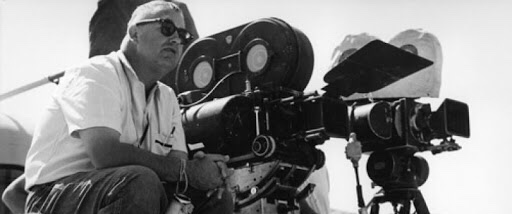
Robert Burgess Aldrich (August 9, 1918 – December 5, 1983) was an American film director, producer, and screenwriter. His notable credits include Vera Cruz (1954), with Gary Cooper and Burt Lancaster; Kiss Me Deadly (1955), The Big Knife (1955), with Jack Palance, Ida Lupino, Wendell Corey, Jean Hagen, Rod Steiger, Shelley Winters, Ilka Chase, and Everett Sloane; Autumn Leaves (1956), with Joan Crawford, Cliff Robertson, and Vera Miles; Attack (1956), with Palance, Eddie Albert, Lee Marvin, William Smithers, Robert Strauss, Richard Jaeckel, Buddy Ebsen and Peter van Eyck; What Ever Happened to Baby Jane? (1962), with Bette Davis and Crawford; Hush…Hush, Sweet Charlotte (1964), with Davis, Olivia de Havilland, Joseph Cotten, Agnes Moorehead and Mary Astor; The Flight of the Phoenix (1965), with James Stewart, Richard Attenborough, Peter Finch, Hardy Krüger, Ernest Borgnine, Ian Bannen, Ronald Fraser, Christian Marquand, Dan Duryea, and George Kennedy; The Dirty Dozen (1967), with Marvin, Borgnine, Charles Bronson, Jim Brown, John Cassavetes, Kennedy, Robert Ryan, Telly Savalas, Robert Webber and Donald Sutherland; and The Longest Yard (1974), starring Burt Reynolds.

Aldrich began his film career at 23, working at RKO Pictures as a production clerk, an entry-level position, after declining an offer through his Rockefeller connections to enter the studio as an associate producer. Though the smallest of Hollywood’s top studios, RKO could boast an impressive roster of directors (George Cukor, John Ford and Howard Hawks) as well as movie stars (Fred Astaire, Ginger Rogers, Cary Grant, Katharine Hepburn and the Marx Brothers). The 23-year-old Aldrich assumed his duties shortly after Orson Welles, at 26, signed a six-movie contract with RKO after the release of the widely acclaimed Citizen Kane (1941).

When the United States entered the Second World War in December 1941, Aldrich was inducted into the Air Force Motion Picture Unit, but quickly discharged when an old football injury disqualified him for military service. The film studios manpower shortage allowed Aldrich to win assignments as third or second tier director’s assistant to learn the basics of filmmaking. In just two years he participated on two dozen movies with well-known directors.

He was second assistant director on Joan of Paris (1942, directed by Robert Stevenson), The Falcon Takes Over (1942, directed by Irving Reis), The Big Street (1942), directed by Reis), Bombardier (1943, directed by Richard Wallace), Behind the Rising Sun (1943, directed by Edward Dmytryk), A Lady Takes a Chance (1943, directed by William A. Seiter), The Adventures of a Rookie (1943, directed by Leslie Goodwins), Gangway for Tomorrow (1943, directed by John H. Auer), and Rookies in Burma (1943, directed by Goodwins).

Towards the end of the war, Aldrich had risen to first assistant director making comedy shorts with director Leslie Goodwins. In 1944, Aldrich departed RKO to begin free-lancing on feature films at other major studios, including Columbia, United Artists and Paramount. He would eventually make directorial debut with Big Leaguer (1953), starring Edward G. Robinson and Vera-Ellen. From there, he had a long, successful career.
Each review will be linked to the title below.
(*seen originally in theaters)
(**seen rereleased in theaters)
- The Southerner (1945) – directed by Jean Renoir – assistant director
- The Story of G.I. Joe (1945) – directed by William Wellman – assistant director
- Force of Evil (1948) – directed by Abraham Polonsky – assistant director
- Caught (1949) – directed by Max Ophüls – uncredited director of reshoots
- When I Grow Up (1950) – directed by Michael Kanin – assistant director
- Limelight (1952) – directed by Charlie Chaplin – assistant director
- Big Leaguer (1953) – director
- World for Ransom (1954) – uncredited director, producer
- Apache (1954) – director
- Vera Cruz (1954) – director
- Kiss Me Deadly (1955) – director, producer
- The Big Knife (1955) – director, producer
- Autumn Leaves (1956) – director
- Attack (1956) – director, producer
- The Gamma People (1956) – directed by John Gilling – story
- The Garment Jungle (1957) – directed by Vincent Sherman – uncredited director
- Ten Seconds to Hell (1959) – director, writer
- The Angry Hills (1959) – director
- The Last Sunset (1961) – director
- Sodom and Gomorrah (1962) – director
- What Ever Happened to Baby Jane? (1962) – director, producer
- 4 for Texas (1963) – director, writer, producer
- Hush…Hush, Sweet Charlotte (1964) – director, producer
- The Flight of the Phoenix (1965) – director, producer
- The Dirty Dozen (1967) – director
- The Legend of Lylah Clare (1968) – director, producer
- The Killing of Sister George (1968) – director, producer
- The Greatest Mother of Them All (short film) (1969) – director, producer
- What Ever Happened to Aunt Alice? (1969) – producer
- Too Late the Hero (1970) – director, writer, producer
- The Grissom Gang (1971) – director, producer
- Ulzana’s Raid (1972) – director
- Emperor of the North (1973) – director
- The Longest Yard (1974) – director
- Hustle (1975) – director, producer
- Twilight’s Last Gleaming (1977) – director
- The Choirboys (1977) – director
- The Frisco Kid (1979) – director
- …All the Marbles (1981) – director

